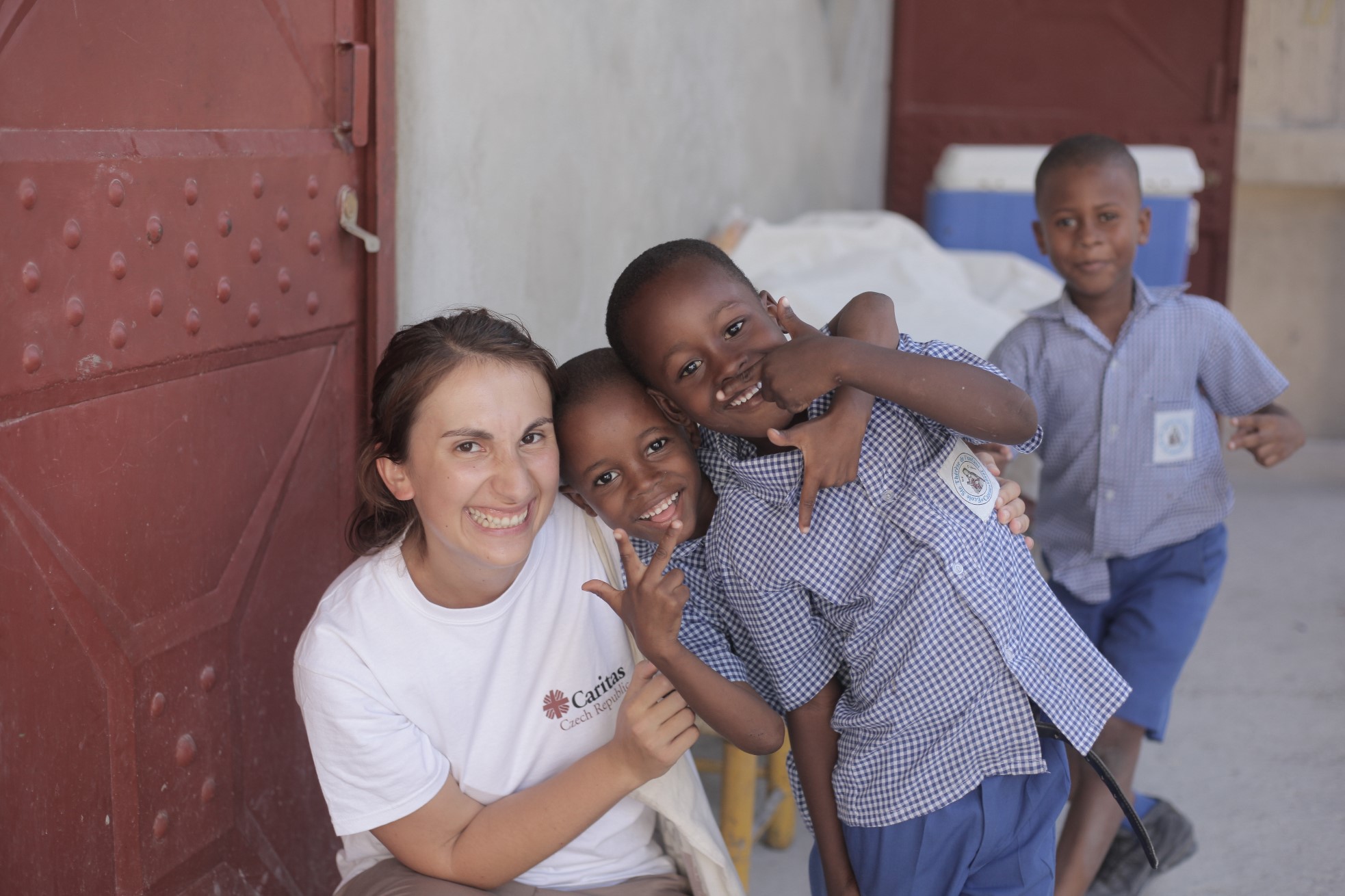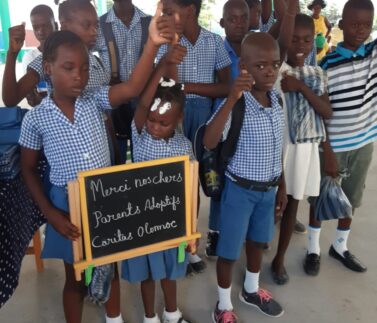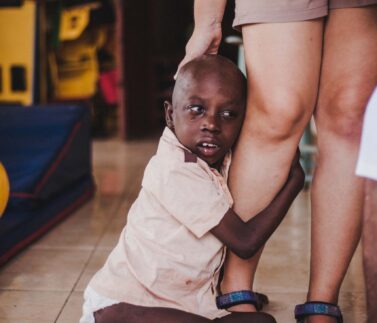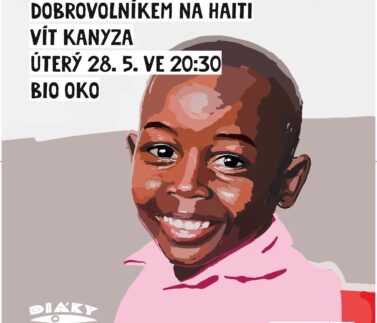
KLÁRA: This work makes sense
Olomouc, November 2017 – Last year she sat in the ravaged church and looked at the clouds, this year the sky was covered by a new roof. What has changed in Haiti? And what has remained the same? On the one hand, there is still the disinterest of government over ordinary people and the famine of numerous families, but on the other hand there is cordiality and solidarity. Klára Lőffelmannová from the Archdiocese Caritas Olomouc has returned a couple days ago from more than a month’s journey through Haiti, the poorest country of the western hemisphere. About how it was you can read more in the interview…
How does it feel arriving on Haiti?
One comes out of the airport and there is chaos and crowds of people all around the place. Lots of them when they see a white person from Europe they assume he has lots of money. That is why it is important to alert before thieves. Luckily there were the Sisters from Port au Prince to pick us up at the airport. But the chaos continues – there are missing traffic signs at the airport and in the city, even the streets are not named. I don’t understand how the Haitians know where to go. So, it is good to have some contacts, occasional access to the internet and also your own driver who knows the way around.
How was it to work in Haiti? Was it all right?
You have to expect everything – that your car might broke down and you won’t reach your destination or you’ll be late for the meeting. Or that rain suddenly starts and floods the streets… You have to be constantly cautious. Haitians also pretend to be pedantically bureaucratic. They don’t deal with things immediately, you fill in the form and you have to come back the next day.
Why is that?
I guess, it is a result of their way of life, but also of the slavery in the past, when paleface men ruled them. Now they dictate, they are those to show the ascendancy and we have to obey. Like when we for example had to give our ID cards to a nurse, while visiting a little girl in the hospital. The nurse had a copy of the ID card which they didn’t accept and they didn’t want let us inside. Luckily, my Caritas’s ID saved us.
Is there anything inspirational in Haiti?
People live much more together, they all greet one another, and they ask about you, they do not hurry. They are very warm-hearted people and without any prejudices. But there is also the danger for the foreigners, that the Haitians will become closer with them and later, they’ll take advantage of it. The Haitians are not doing well and they can see the possibility of money flow in the foreigners, the possibility of getting away…
How does an ordinary person in Haiti live?
The Haitians are glad when they have a shelter, some food and water. The land prices and the prices in the construction industry are very high, even the food is very expensive. They mostly eat rice and beans because that’s the cheapest option and there is always enough of it, so it will feed them. If they have a garden they can grow even some fruit and vegetables. And if they grow something extra they’re trying to sell it and earn some money. It’s a bit funny when you see women at the roadside and all of them, one next to each other, sell mangos. There is a 40 % unemployment in Haiti, so many people cannot send their children to school; they simply do not have enough money.
Last year it was your first visit in the Carribean, it was shortly after the hurricane and there were lot of demonstrations due to the delay of the presidential election. Has the situation changed since then?
This year everything was going as it should. Unlike last year, when we had to change our plans every day. As far as it is concerned the demonstrations and riots they are still there. Although they elected a new president, they don’t know what an opposition is, so they are trying to overthrow him. It is all about power. This year, when we should go from the capital to Gonaïves, there have been reported three-day manifestations. In order to avoid the roadblocks, burning tires and so on, we had to pack and leave one day earlier.
What had to be done during the trip on this year?
We held a medical camp for all the children of Baie de Henne’s school. We negotiated the Container for Haiti with the humanitarian aid. We monitored the roof repairs after a hurricane. And we checked projects of Caritas Slovakia. We visited schools as well, where we have the Child Sponsorship Programme – we brought letters for kids from their adoptive parents and children replied to them. Furthermore, we had to discuss all news with our local partners – we had to found out how children, who have left the Child Sponsorship Programme, are doing.
Is it difficult to reach those kids?
Luckily, we have established good contacts, for example with former students from this programme, who are helping us.
How do they continue once they have graduated?
It is important to have an education, because when Haitians want to work in the supermarket, they need to have a diploma. But the problem is, that there is not enough work at Haiti. The children graduate from the high-school and they don’t find a job. It is difficult to deal with this, the job market can be changed only by the government, but the government does not do much for that… The children help at home, on the field or start new families. Only a few of them continue studying at the University, but not a lot of them have money to afford it. Some enter the Order or prepare themselves for the priesthood.
Is it possible to do something about it?
We want to take advantage of the functional sewing workshop in Gonaïves, so we’ll see how that goes. And if it will be all right, we’ll start one in Baie de Henne as well. People could learn even some other crafts.
What was the most powerful experience (which got under your skin) this year? Do you remember…?
The visit of the repaired church in the South in Roche-a-Bateau. I was there last year, looking at the sky, because the hurricane took the roof of the church. And when I returned now, the new roof was above me (Archbishopric of Olomouce contributed to it) and below were people getting ready for a wedding and celebrating the feast of St. Michael. This roof is very important for the Haitians. The church is also a cultural centre in here. It connects people.
I was also very touched by a meeting with one high school student in Gonaïves who’d waited outside of the nun’s Centre of St. Joseph. We talked and he asked me, where am I from and what do I do in Haiti. He was fine. At dinner, the nun shared with me a sad story. That day one boy went to visit her. He lives with his mom and younger brothers and sisters. He kept repeating to the nun: “I’m going, I’m going“. He couldn‘t explain what he was thinking about. The nun didn’t understand and asked: Do you want to emigrate? The boy replied, that it’s been four days, that his family doesn’t have anything to eat and that he cannot keep watching this. Then, he took out the knife from his backpack. He wanted to kill himself. The nun hold him and explained, that he won’t help his family in this way. She invited him to come to the Centre after school to help her in a garden. At least he could earn some money. It was the boy with whom I spoke that day.
You’ve come back to the Czech Republic a few days before – are you already looking forward to go back to Haiti…
The travel always fills me with energy to the next work. You can see it makes sense to do things in Haiti. You also re-evaluate your priorities and come back with a new perspective. Suddenly you focus more on the people around you and you want to spend more time with them. I’m grateful for the work I do and I thank to volunteers, adoptive parents, our donors and to all the people who are helping us. We couldn’t do the job without you.
Thanks for the interview. Karolína Opatřilová, ACHO



